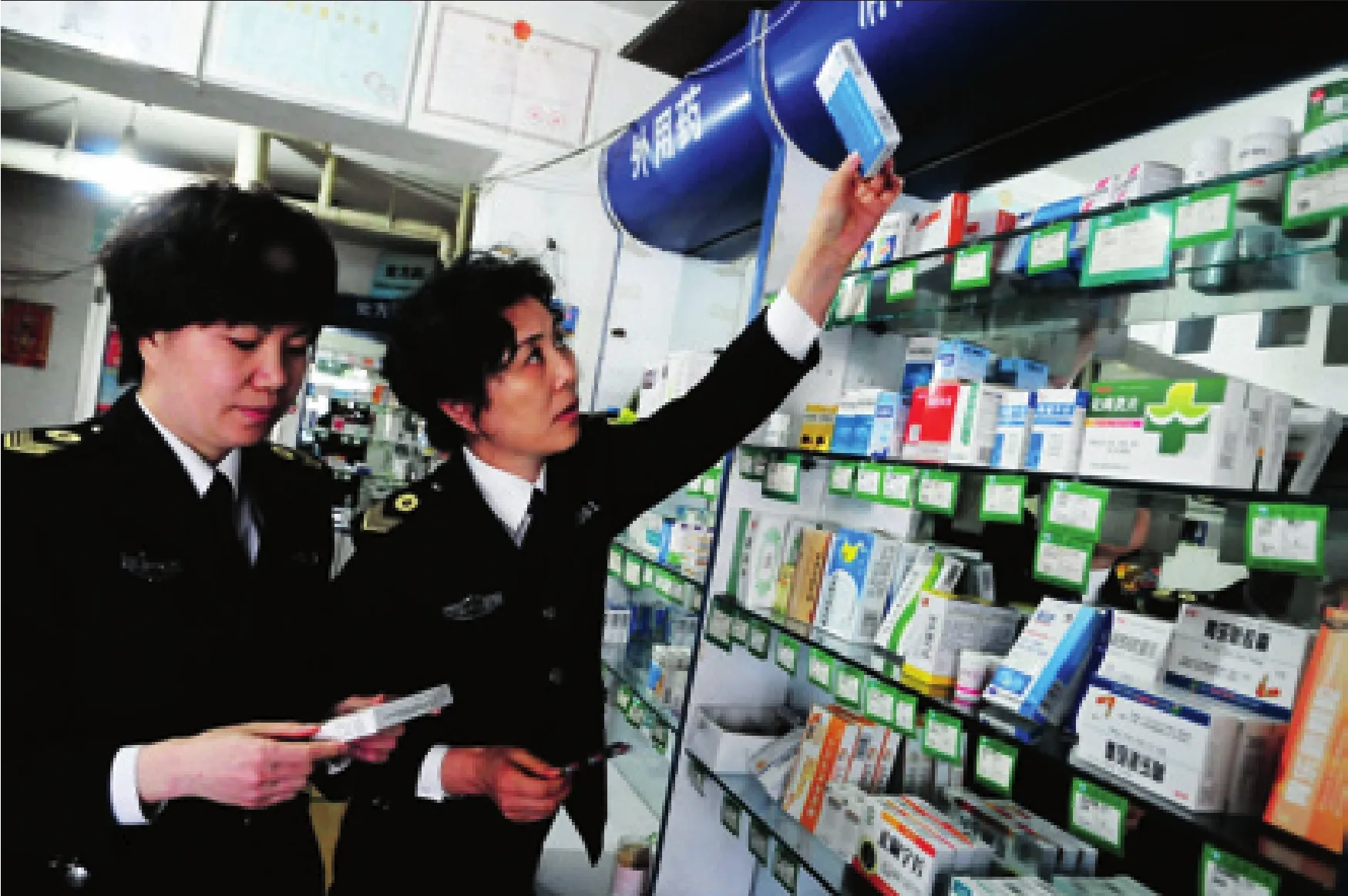Unsafe Capsules
2012-10-14MedicinecapsulescontainingheavymetalsarethenewfrontlineinChinauphillbattletoensureitsfoodanddrugsafetyByLiLi
Medicine capsules containing heavy metals are the new frontline in China’s uphill battle to ensure its food and drug safety By Li Li
Unsafe Capsules
Medicine capsules containing heavy metals are the new frontline in China’s uphill battle to ensure its food and drug safety By Li Li

VITAL INSPECTIONS: Drug safety regulators inspect a drug store for unsafe capsules in Qingdao, east China’s Shandong Province, on April 16
Blog posts explaining how to take pills without eating the shells of pharmaceutical capsules recently went viral on the Internet in China. Those taking capsules are advised to bury the contents of the capsule inside a piece of bread, cucumber or banana and then swallow the whole thing. One post suggests making glutinous rice balls, a popular snack with sweet fillings, with the capsule’s contents as filling.
These novel ways of ingesting medication aren’t simply a fad or some new online amusement. Rather, they are serious measures being taken by Chinese consumers to protect themselves from being poisoned after a toxic gelatin capsule scandal was revealed by the media.
A total of 13 commonly used drugs were found to be packed into gelatin capsules made from industrial gelatin, which contains a much higher degree of chromium than edible gelatin, China Central Television (CCTV) reported on April 15 in a program on quality standards.
Edible gelatin, which is more expensive than industrial gelatin, is made from animal bones and leather. Gelatin for industrial use is made from waste leather products, such as shoes and handbags, which are usually highly contaminated by chromium, as a result of the tanning agent used when processing leather. Chromium can be toxic and carcinogenic if ingested in excessive amounts.
The Chinese Pharmacopoeia, a code representing the national standard for drugs, has set a clear standard for capsules and requires drug makers only to purchase capsules from manufacturers with appropriate drug-making licenses.
The code stipulates that the content of chromium in capsules and the gelatin for making them must be no more than 2 mg per kg, or 0.0002 percent. According to the CCTV report, some of the most contaminated capsules contained 181.54 mg of chromium per kg or more than 90 times the upper limit.
An employee with a capsule factory in Xinchang, Zhejiang Province, said that industrial gelatins, secretly used by local producers, could significantly reduce the costs and were thus very popular despite the fact that its chromium content exceeds the national standard, according to the CCTV report.
Amid the public uproar, a gelatin factory involved in the scandal resorted to arson in hopes of covering up the truth.
Police in Fucheng County, north China’s Hebei Province, said that Liu Aiguo, a staff member of the Xueyang Glair Gelatin Factory, set the office building of the factory on fire on April 15 after its name appeared in the CCTV report on toxic capsules. Song Jianxin, a former local official and brother of the legal representative of the factory, allegedly masterminded the arson, in an attempt to destroy computers, account books and files in the factory.
The factory produced about 280 tons of gelatin a year and employed 32 workers. Its products, mainly industrial gelatin, were sold to other factories or customers in Beijing and coastal Jiangsu, Fujian as well as Zhejiang provinces.
The arsonist initially escaped through the back gate of the plant, but he was later apprehended by the police. Both Song and Liu are in police custody pending further investigations, the police said.
Online rumors said that industrial gelatin may also have been used in the production of solid yogurt and puddings, but major dairy producers have dismissed the allegations as forged.
The State Food and Drug Administration (SFDA) issued an emergency notice on April 15 and ordered 13 medications produced by the nine pharmaceutical companies named in the CCTV report to be suspended from distribution and use until they are cleared by an authorized lab analysis. In the same notice, the administration ordered provincial-level food and drug safety watchdogs concerned to investigate the cases and examine the drugs mentioned in the CCTV report.
On April 19, the SFDA announced analysis results for 42 batches of medication, finding that 23 of the batches contained excessive amounts of chromium, including several produced by the nine companies named in the CCTV report.
Manufacturers have been ordered to recall batches of contaminated medication and have them destroyed under supervision.
On April 20, the Ministry of Health ordered all medical facilities to sort through their inventories, remove and seal any of the medications listed by the SFDA as being possibly contaminated. Hospitals must refrain from purchasing or using the listed medications until the SFDA finishes examining them, a ministry statement said.
Inspection teams from several departments, including the police, health authorities and supervision agencies, have been sent to Zhejiang, Hebei and Jiangxi provinces to supervise the investigation of the case, the SFDA said on April 21.
The following day, the Ministry of Public Security said on April 22 that it had confiscated 77 million capsules made from toxic chromium-contained industrial gelatin. The police had also arrested nine suspects, detained 54 and sealed 80 industrial gelatin and capsule manufacturing lines.
Online responses
After the scandal broke, a 60-year-old woman in Hangzhou, Zhejiang Province, was reported by a local newspaper to have burned her esophagus after removing the coating of three cold medicine capsules and swallowing the medicinal powder directly. This piece of news has inspired a legion of netizens to brainstorm on “innovative” homemade food coatings for drugs.
Many netizens expressed their anger and frustration on the Internet. Weibo.com, a popular Twitter-like micro-blogging service in China, was flooded with comments, condemning lax supervision and low safety standards in China’s pharmaceutical industry.
Some micro-bloggers condemned the loss of credibility and conscience of pharmaceutical companies, with one questioning, “How can we expect to be cured when the medicines coming to our rescue are poisonous themselves?”
Many Internet viewers called on supervisory authorities to establish a well-functioning mechanism to improve food and drug safety.
Sun Zhongshi, a researcher with the National Rational Drug Use Monitoring System under the Ministry of Health, was quoted by the Xinhua News Agency as saying that current regulations require drug authorities to only check the quality of active ingredients of drugs before they enter the market.
“The relatively lax quality check of nonactive pharmaceutical products like medicine capsules has become a loophole used by profiteers,” Sun said.
Hackers have also done their bit to join the condemnation. The Tonghua Golden-Horse Pharmaceutical Industry Co. Ltd. in northeastern Jilin Province, whose products were found to contain excess chromium, had its website hacked on April 16 and visitors to the site was greeted with a message condemning the company’s misconduct.
“How can you make capsules from the broken shoes I threw away? Every hacker in China should join the attack against these criminal companies,” the hackers said in the message.

CONTAMINATED PILLS: Toxic drug capsules from a factory in Zhejiang Province that have been confiscated by the police

CRIME SCENE: Processed leather scraps are soaked in chemicals for softening in a factory involved in the toxic capsule scandal
